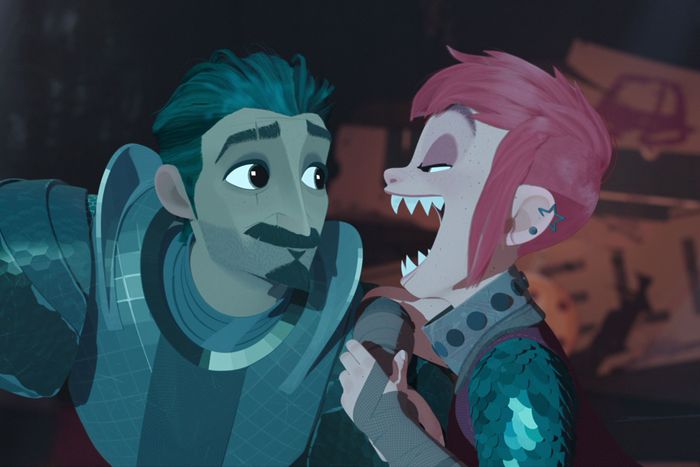
On January 23, 2024, Nimona was nominated for a Best Animated Feature Film Oscar.
Nimona is a pink-hued shapeshifter who can take on any form, from the animal to the fantastical to the human. Most of the time, though, she appears to be a teenage girl, which is a popular choice for misunderstood magical animated beings of the moment. Nimona drops on Netflix the same week that Ruby Gillman, Teenage Kraken, about a high-schooler finding out about her secret sea-monster heritage, opens in theaters. It’s not a metaphor that requires much explanation — the world has all sorts of ways of making a young woman feel freakish. But Nimona, who’s voiced by Chloë Grace Moretz, never questions her own fluid nature. Whether she’s a quippy punk kid, a rampaging rhinoceros, or a dancing shark, she’s always gleefully herself. The problem is everyone else in the kingdom, who have lived in terror of beings like her for centuries. They’ve built walls around their city and trained a legion of knights to protect their citizens, even as the encounters that inspired all this fear remain the stuff of distant legend.
Nimona looked like it was going to become the stuff of legend itself at one point — after multiple delays, production on the almost-finished film was canceled in 2021 after Blue Sky was shut down by Disney, which had acquired the animation studio as part of the Fox merger in 2019. Disney higher-ups had reportedly been leery about Nimona’s queer themes, and the movie definitely doesn’t traffic in the kind of blink-and-you’ll-miss-them “exclusively gay moments” that got the company mocked on The Other Two. There’s nothing remotely ambiguous about the romance between Ballister Boldheart (Riz Ahmed), the movie’s other main character, and his swoony fellow trainee Ambrosius Goldenloin (Eugene Lee Yang), one that’s laid out in the opening sequence as they embrace and declare their love for one another while looking down at the arena where they’re due to be knighted. But what makes Nimona so refreshing is that it doesn’t just plunk these characters onscreen as a contribution to the battered cause of representation — it also has something to say about them and their respective relationships with the status quo.
Ballister is an outlier, not because of his sexuality, which doesn’t appear to be a point of contention in the film’s futuristic medieval world of flying cars and high-tech swords, but because he’s a street kid who was allowed to enter contention to become a knight by Queen Valerin (Lorraine Toussaint), a privilege previously reserved for a pedigreed few. Because of this, the public regards him with suspicion even though he’s at the top of his class, and when he’s framed for the queen’s murder, even Ambrosius — who chops off Ballister’s arm trying to stop what looks like an attack — believes he’s guilty. Nimona bursts into the fugitive Ballister’s life hoping he’s a supervillain she can appoint herself sidekick to in pariah solidarity. What she finds instead is a man so invested in the institutions he’s struggled to find acceptance from that he doesn’t want his quest to clear his name to cast any doubt on them. Nimona, which was directed by Nick Bruno and Troy Quane (of Spies in Disguise) and written by Robert L. Baird, Lloyd Taylor, and Pamela Ribon, isn’t delicate about these ideas — the knights are part of what is literally called “the Institution,” run by the aloof Director (Frances Conroy). But there’s a chilling effectiveness to the way Ballister speaks to Nimona, whom he finds too destructive, too loud, and just too much, after reluctantly accepting her help.
“Can you please just be normal? I just think it’d be … easier if you were a girl,” he asks when she reclines on the subway as a coral gorilla. “Easier for who?” she responds, and he assures her, “For you! Other people aren’t as accepting as me,” words familiar to anyone who’s been told they’re responsible for the bigotry they face from others because they’re too visible, too much in their basic existence. Nimona is based on a webcomic by ND Stevenson, who’s a co-producer and who transitioned in the years between the end of the comic and the release of the film. Stevenson has written about how it seems obvious in retrospect that the character represents transness, even if it wasn’t something he realized at the time. The interactions between Nimona, who wants to question the assumptions their society is built on, and Ballister, who just wants to secure a place for himself in that society, are made more plaintive by the fact that she’s a gender-nonconforming being whose fluidity is seen as a threat and he happens to be a stereotypically masculine gay man. Nimona significantly revamps Stevenson’s original story and swaps his sparer aesthetic for something more frenetic in style and conventional in its look. But at the film’s heart remains a relationship that’s radical and sad. Ballister hopes that he can belong if he proves himself worthy, a desperate longing the movie itself can’t let go of in the end. Otherwise, what would be left is the long and painful work of opening up how people think — which isn’t the stuff of fairy tales.
More Movie Reviews
- The Accountant 2 Can Not Be Taken Seriously
- Another Simple Favor Is So Fun, Until It Gets So Dumb
- Errol Morris Has Been Sucked Into the Gaping Maw of True Crime


